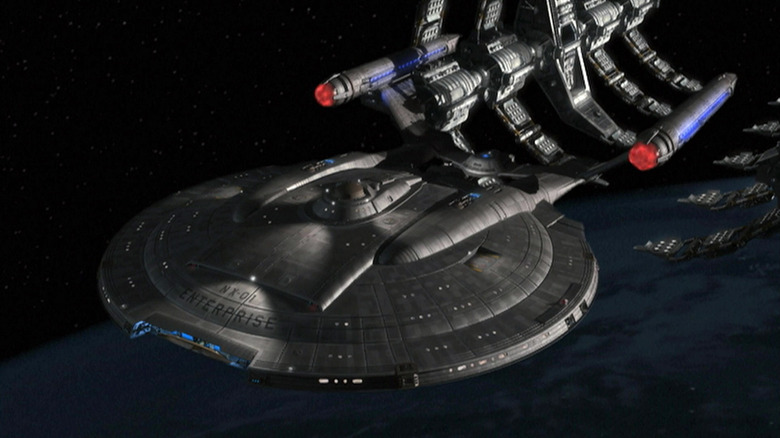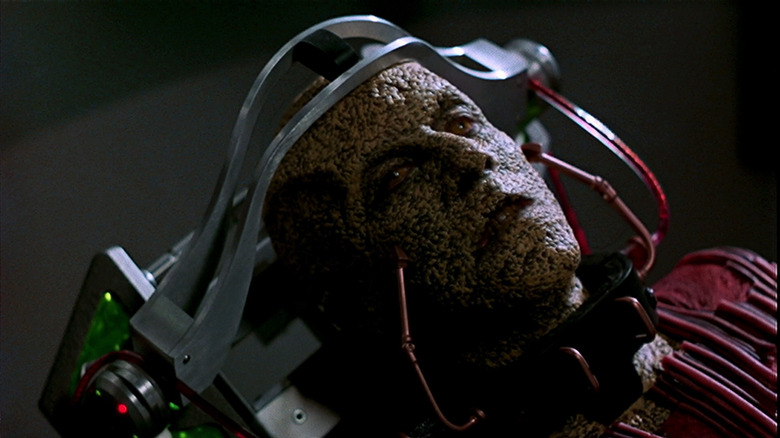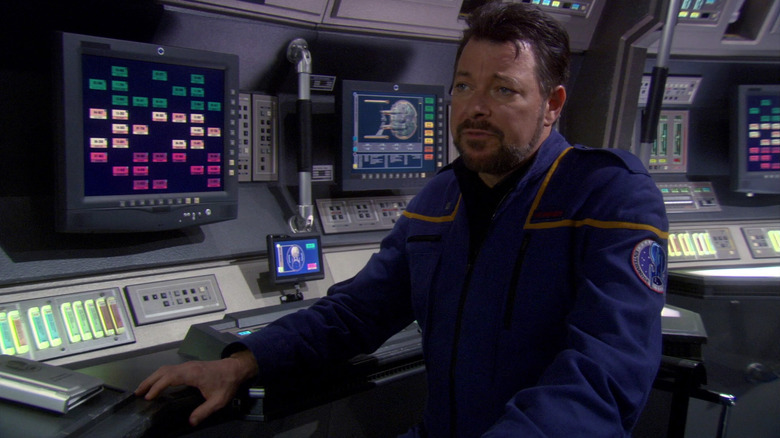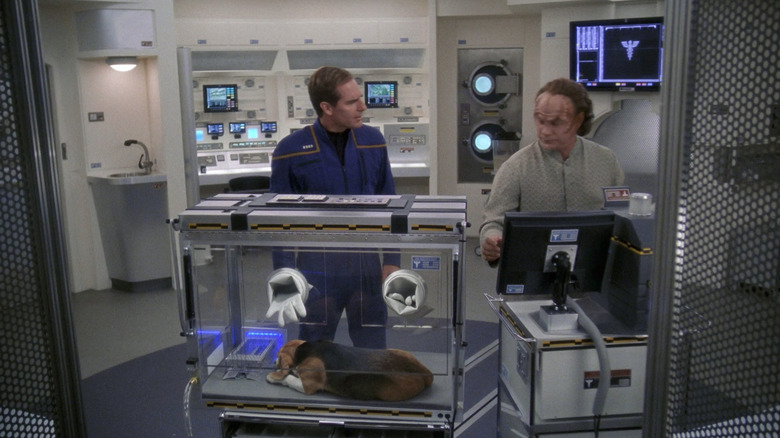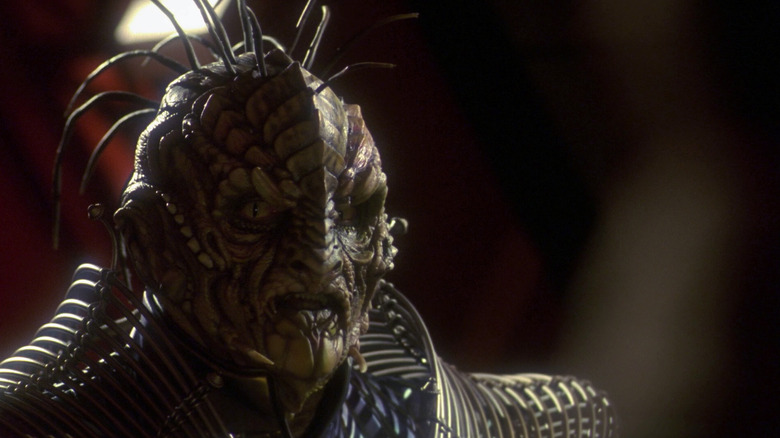Every Season Of Star Trek: Enterprise, Ranked
When "Star Trek: Enterprise" was canceled in 2005 — after only four seasons — it seemed like the end of the road for the franchise. "Enterprise" always struggled to find and audience, unable to re-light the fire that burned beneath "Star Trek" throughout the 1990s. Although "Enterprise" was conceived of by the same team that oversaw "Star Trek: The Next Generation," "Star Trek: Deep Space Nine," and "Star Trek: Voyager," it felt that the entire, uh, enterprise was running out of steam.
Many have theorized as to why "Enterprise" wasn't as big a hit as its three forebears (which lasted seven seasons apiece). Some felt that the writing wasn't as sharp. Others objected to the old-world "cowboy" feeling of the show. I posit that the series wasn't welcome in 2001. "Enterprise" debuted only two weeks after the events of 9/11, and the country had suddenly shifted into a mindset of tragedy and military revenge. A franchise about pacifism, negotiating with your enemies, and practicing nonviolence wasn't welcome in that environment. "Star Trek" had to take a nap for a while. It's telling that "Star Trek" only resurged in popularity when, in 2009, a non-Trekkie adapted it into a revenge-based action movie.
It also came at a time when TV was in flux. Many shows in the early 2000s were moving from traditional episodic storytelling to more DVD-and-streaming-friendly arc-based storytelling. "Enterprise" was mostly episodic, but did a lot of experimentation with arcs, sometimes with success, sometimes not.
Since its cancelation, however, "Enterprise" has undergone an extensive relitigation, and many Trekkies have found many reasons to love the show. Sure, it was stodgy at times, but it contained a lot of interesting notions about "Star Trek," as well as new and unexpected ideas.
Below is a ranking of the show's four seasons, along with my personal reasoning behind the ranking.
4. Season One
No "Star Trek" series (with the possible exception of "Strange New Worlds") started with its best foot forward. Most of the "Star Trek" shows, even the great ones, had to struggle through their first seasons, discovering their identity and exploring their own premise with a clumsy hand. Historically speaking, the '90s "Star Trek" shows didn't become truly great until around their respective third seasons.
"Enterprise" also struggled through its first season, as it boasted a story arc that few remember, and even fewer are fond of. "Enterprise," to remind readers, was a prequel TV series set about a century prior to the events of the original "Star Trek" series. It followed the adventures of Earth's very first Starfleet vessel, the Enterprise, as it trekked into the stars. It came at a time when there was no Federation, no tractor beams, no shields, and no human-safe transporters. Naturally, the series explored Earth's early relationships with familiar alien species like the Vulcans, the Klingons, and the Andorians.
But, to assure audiences that there would be new aliens and stories as well, "Enterprise" introduced the Suliban and their involvement with a mysterious Future Guy. It seems that the Suliban were involved in a Temporal Cold War wherein they received instructions from a shadowy figure from the 27th century. The details of the war were kept vague in an effort to sell "Enterprise" as a "mystery box" program. Sadly, the mystery wasn't terribly interesting, and the Suliban never emerged as a favorite. The Temporal Cold War arc continued into the second season for a spell, but was eventually abandoned.
On top of that, the one-and-done episodes of the first season were slow-moving and too often fell back on old-fashioned, near-sitcom-like storytelling. One could see that "Enterprise" was finding its feet.
3. Season Four
Season 4 of "Enterprise" was its most ambitious, and it featured some of the more memorable moments of the series. Unlike the third season, the fourth wasn't overwhelmed by a large, singular story arc, but by several multipart episodes. This seemed like a good compromise for "Star Trek," allowing it to wrap up its stories quickly (as per usual), but still let larger stories breathe. It was in the fourth season that we got to see an ancestor of Data from "Next Generation" explain how he became obsessed with creating an ideal life form. It was canonically explained in season 4 why Klingons look different from the original "Star Trek" to the days of "Next Generation." There was also a fun two-part episode that was set almost entirely in the evil Mirror Universe, and saw the appearance of old-school Trek monsters like the Gorn and Tholians.
But the lows of season 4 were very low. For one, the show finally tried two wrap up the Temporal Cold War storyline, which was a merciful end, but took up precious time. Also, while the above references were fun, one could sense the makers of "Enterprise" panicking, unable to draw the viewers' interest in any other ways than making references to the original "Star Trek." Season 1 sought to establish a unique identity. By season 4, they only had flashbacks and nostalgia left.
Indeed, the show's final episode, "These Are the Voyages..." is one of the worst episodes in the franchise. It cuts from the central action of "Enterprise" to the U.S.S. Enterprise-D, whereupon Commander Riker (Jonathan Frakes) from "Next Generation" is essentially watching the episode on his holodeck. He inserts himself into the action, making himself the main character. All the "Enterprise" figures were replaced by holograms. Talk about an anticlimax.
2. Season Two
There were no notable, long-term arcs in season 2 of "Enterprise," and it seemed that the show's writers had finally become accustomed to the NX-01 and its quirky crew. In season 2, it felt like most of the show's main characters could finally emerge, having developed working relationships. T'Pol (Jolene Blalock) and Captain Archer (Scott Bakula) continued to explore their contentions and bickersome relationship, while Trip Ticker (Connor Trinneer) solidified as the crew's preeminent screw-up. Only poor Travis Mayweather (Anthony Montgomery) was given the short shrift; he had only one episode all his own. Dr. Phlox (John Billingsley) became one of my favorite characters in all of "Star Trek," endlessly upbeat and open-minded, but still deeply principled. His species, Denobulans, hadn't been seen on "Star Trek" before, so it was fun to explore the fineries of his society; Denobulans, for instance, are polyamorous. He starred in the best episode of the series, called "A Night in Sickbay."
It was in the show's second season that viewers finally got to see what everyday life was like on the NX-01. It detailed the clumsy sense of diplomacy that Captain Archer had, and also his determination to improve. The show felt optimistic and forward-thinking for the first time. In a disastrous episode called "The Communicator," they learn the dangers of leaving their own technology behind on a non-warp-capable world. In "Cogenitor," ideas of gender and sexism are explored. For its second season, "Enterprise" began to feel like traditional "Star Trek" again. It wasn't necessarily anything beyond that — some Trekkies didn't like the "more of the same" vibe — but there's a reason why Trekkies keep coming back to the same kinds of stories. We like them. We like life on a ship. Season 2 had the most of it.
1. Season Three
As mentioned, "Enterprise" debuted shortly after 9/11, but it would take until season 3 for the series to address those events with clarity. Drawing a direct parallel, the "Enterprise" writers concocted a story wherein a mysterious and unknown species called the Xindi unexpectedly attacked Earth with a massive superweapon powerful enough to destroy the state of Florida. Captain Archer turned from an ambitious diplomat into a warmongering "tough guy," a change some of us may have seen in our family members at home. The Enterprise took on a military retinue, and set off on a mission of investigation ... and revenge. The third season, in a poignant way, asked if the ideals of "Star Trek" could hold when the entire planet's ethos shifted toward sadness and anger. The prequelized nature of "Enterprise" meant that Captain Archer wasn't necessarily going to stick to the letter of the law. The series became scary and finally felt salient to the politics of the day.
Also, I like the Xindi. It seems that the Xindi weren't one humanoid species, but six, all having evolved simultaneously on the same planet. The multi-species nature of the Xindi made them hard to track. It also assured that they weren't unified in their hatred of Earth, and complex negotiations had to be put into effect. The species were made up of the Reptilians, the Primates, the Arboreals, the Aquatics, and the Insectoids. There was once a species of Avians as well, but they went extinct. The exploration of Xindi history, and their manipulation by time travelers, was actually interesting. "Enterprise" was able to enter the realm of longer story arcs, and did so, I feel, with energy and aplomb.
Given that we were mired in the post-9/11 world, the third season of "Enterprise" kind of had to happen. I'm glad it did.
